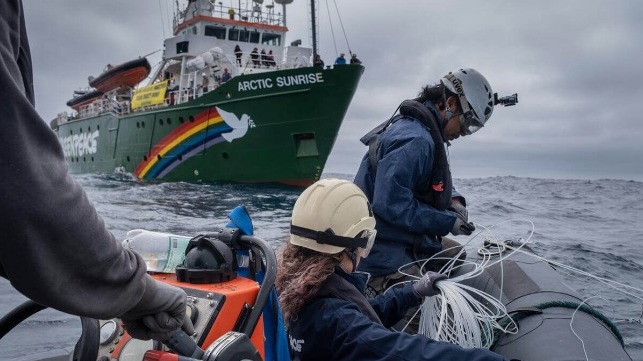Greenpeace Seizes Longline Fishing Gear to Highlight Threat to Sharks

Greenpeace is warning of the effects of industrial longline fishing on shark populations after its activists confiscated fishing gear from two vessels in the North Atlantic, one of which was operating in a Marine Protected Area.
The NGO announced that its activists aboard the Arctic Sunrise operating in the North Atlantic waters confiscated 30 kilometers of industrial fishing gear and 286 hooks from two European industrial longline fishing vessels, Segundo Ribel and Siempre Perla.
The longliner vessels from Spain were fishing for sharks and swordfish. Past analysis of total catches of swordfish and blue sharks in the North Atlantic shows that the approximate ratio of blue shark catches compared to swordfish is one swordfish for every five blue sharks.
The team managed to release a blue shark, seven swordfish and other marine life caught on the lines. The activists in total found seven swordfish, one blue shark, one sea bream, one barracuda and two long snouted lancefish, all of which were safely released back into the water.
Greenpeace reckons that the total length of line in the water on an average fishing day is 1,200 kilometers, meaning that the 30 kilometers of longline recovered is only 2.5 percent of the total. A typical fishing day in the North Atlantic also involves an estimated 15,500-28,000 hooks in the water.
One of the vessels was operating in the Milne Seamount Complex, a marine protected area. Although longlining is legal within the complex, it has adverse impacts on the ecosystem, demonstrating the need for a strong treaty to properly protect high seas from industrial fishing, according to Greenpeace. There are currently no regulations limiting longline size or hook usage in the Atlantic waters.
“We could only confiscate a tiny proportion of the longlines, but what we found makes clear the horrors of industrial fishing. What’s the point in protecting a place if environmental destruction like this is still allowed? Protected areas like this are a perfect example of the broken status quo: protected on paper, but not on the water,” said Maria José Caballero, Greenpeace España oceans campaigner.
Greenpeace contends that overfishing of sharks in the North Atlantic waters is increasingly endangering the species, with blue sharks being the most commonly fished sharks. Spanish and Portuguese fleets are mainly responsible for the vast majority of landings, according to the NGO.
The organization is calling on leaders to finalize a Global Ocean Treaty at UN negotiations in August. Failure to agree on a strong treaty will make it almost impossible to protect at least 30 percent of the world’s oceans fully by 2030, they argued. Scientists say this is the minimum required to give the oceans space to recover.

that matters most
Get the latest maritime news delivered to your inbox daily.
“The European Union and its member states like Spain claim they are champions of ocean protection, while their fishing fleets cause environmental harm at sea. It’s hypocrisy on an industrial scale. We need a strong Global Ocean Treaty to be finalized this August, which changes how high seas fishing is managed, to give the oceans a chance to recover,” added Caballero.
Since 1970, the global abundance of oceanic sharks and rays has declined by a staggering 71 percent with an 18-fold increase in relative fishing pressure, according to a recent Greenpeace study. The report shows that despite the transition of the North Atlantic fishery from swordfish to shark, regulations have not kept pace, and a growing market for shark products is fueling demand.
